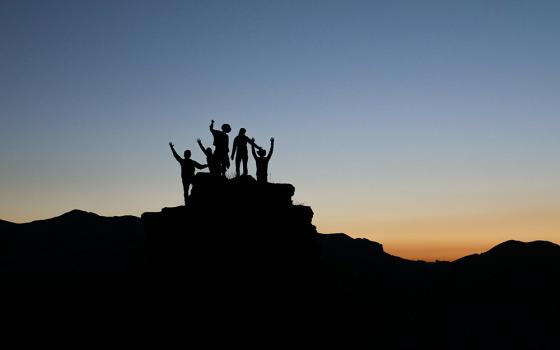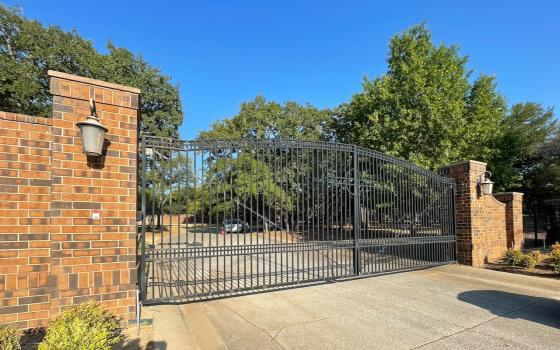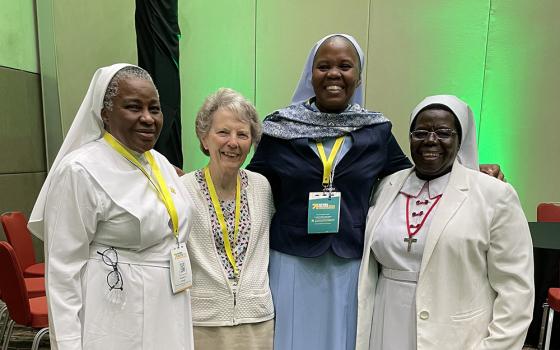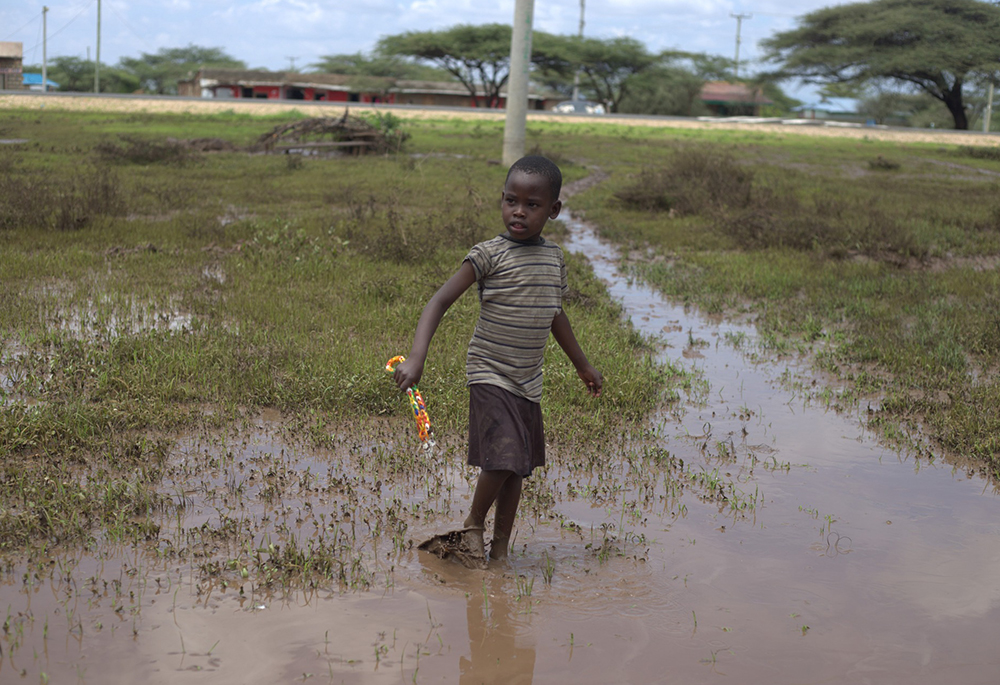
A child walking through the flooded water in Samburu, northern Kenya, on Nov. 9. (GSR photo/Doreen Ajiambo)
Jere Mirhichan recently stood near the wooden fence of his flooded homestead in this northern town. He looked at his dead livestock then turned to his sympathizers as if one of them could miraculously resurrect his cows, goats and sheep.
Mirhichan's livestock died on Nov. 23 after they were swept away by raging floodwaters that have also killed hundreds of people, displaced thousands and destroyed crops and other properties. Just a few months earlier, Mirhichan lost dozens of his livestock due to a drought that had hit the region for more than four successive years.
"I have now lost everything. During the drought, I lost more than three-quarters of my livestock, and now the floods have killed the remaining livestock," lamented the 50-year-old father of eight, a pastoralist. "As I speak, I have nowhere to sleep with my family. We are taking shelter in different schools and churches around here."
Mirhichan mourned that the effects of climate change have left him and millions of other residents homeless and in poverty, as livestock and crops are their only source of livelihood. In Africa, for example, at least 15,700 people have lost their lives to extreme weather disasters this year, according to the latest report from Carbon Brief. At the same time, another 34 million have been affected.
"The world leaders should now come to our rescue because we suffer both in rain and drought season," he said, noting that the humanitarian aid will help communities recover in the aftermath of disaster. "We are poor because of the effects of extreme weather events. We have no food to eat and cannot even pay school fees for our children."
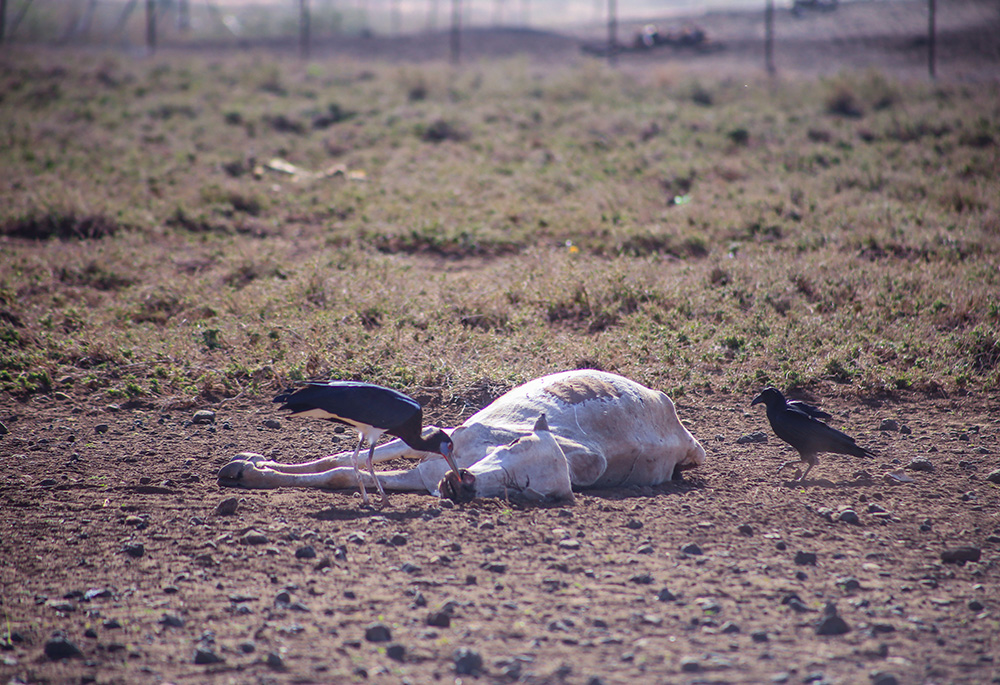
The four-year drought in East Africa killed thousands of animals in Marsabit in northern Kenya and other areas. (Pius Artbeat)
Mirhichan is one of millions of victims of climate and weather-related disasters globally, especially in Africa, who are decrying the neglect by world leaders as they continue to suffer from adverse effects of the El Niño rains, droughts, wildfires, storms, hurricanes, and other climate-related shocks.
The victims are urging world leaders to immediately disburse loss and damage funds when they convene at the U.N. climate change conference, or COP28, in Dubai, United Arab Emirates, from Nov. 30-Dec. 12.
'We are poor because of the effects of extreme weather events. We have no food to eat and cannot even pay school fees for our children.'
—Jere Mirhichan, pastoralist in Marsabit, Kenya
During last year's United Nations COP27 climate summit in Egypt, countries adopted a agreement that established a fund to help developing countries cope with the extreme weather events caused by global warming. According to the CDP Africa Report, Africa accounts for the smallest share of global greenhouse gas emissions at 3.8%, in contrast to 23% in China, 19% in the U.S., and 13% in the European Union. Yet, it faces some of the most severe challenges due to climate change.
Many countries, including Belgium, Canada, Germany, Denmark and Ireland, pledged millions of dollars at COP27 to fund loss and damage, which is referred to as the costs of recovering from climate impacts that several developing countries cannot afford, thus advocating for global financing. On the first day of COP28, Nov. 30, host country United Arab Emirates, along with Germany, pledged $100 million each toward the fund.

Camels are used to desert conditions, but the severe drought in northern Kenya that lasted for four years killed hundreds of camels. (Pius Artbeat)
The United Nations last month announced it had raised $9.3 billion, falling short of a $10 billion target after the United States and other wealthy nations failed to fulfill their climate finance pledges, according to Earth.org.
The failure of wealthy nations to fulfill their pledges has prompted victims of climate change to put more pressure on those nations' governments ahead of COP28 to make good on their promises to help vulnerable countries prepare on how to deal and cope with climate change.
"We want to see these funds so that lives can be saved now. How many people do the wealthy nations want to see dying as a result of climate change for them to act?" asked Violet Chirwa, an advocate for climate justice who was affected by Tropical Cyclone Freddy that struck Madagascar, Malawi and Mozambique early this year.
Chirwa, a resident from Zomba, a city in southern Malawi, told Global Sisters Report that she lost three of her family members in February when the deadly storm swept by home in the middle of the night. The cyclone killed over 500 people across southern African countries and displaced more than 1.5 million people as it washed away homes, livestock, crops, roads and other infrastructure.
"We don't want talks. We want action during COP28 because climate change makes cyclones more intensive and destructive," she said. "It's unfair to us because wealthy people, mostly from rich countries, cause pollution, which affects poor people from poor countries. They should be responsible and compensate these poor people who are suffering as a result of their actions."
Religious leaders, including sisters attending the convening, have vowed to advocate for funds to be adopted and immediately disbursed to vulnerable communities impacted by the effects of climate change and who are unable to adapt to significant loss of lives and livelihoods.
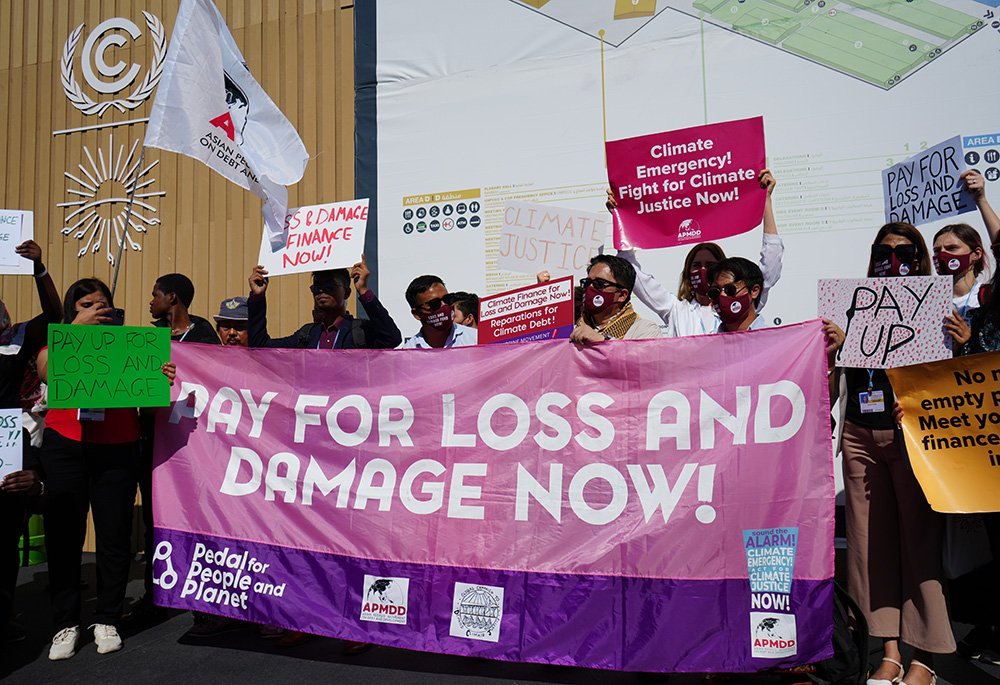
Climate activists including religious leaders demonstrate, calling for money for climate action at the COP27 U.N. climate summit, Nov. 11, 2022, in Sharm el-Sheikh, Egypt. (GSR photo/Doreen Ajiambo)
Maryknoll Sr. Susan Nchubiri warned governments and businesses that failing to implement the pledges they made during COP27 on loss and damage funds would lead to more deaths and suffering for those vulnerable to climate change.
"We need to act now for our own sake and the future generations," Nchubiri told Global Sisters Report from Expo City in Dubai, the host of COP28 climate talks. "Governments and corporations that have highly contributed to the current global climate crisis should be accountable and responsible for its healing by not only changing the way they operate but also supporting the less economically able countries to produce and consume green energy and technologies."
Sr. Alice Jurugo Drajea, superior general of the Sisters of the Sacred Heart of Jesus, said the issue of the loss and damage fund was urgent since the communities her congregation serves in South Sudan were already experiencing floods caused by heavy rains that have swept away entire villages and farms, drowned livestock, and destroyed roads and other infrastructure.
"Effects of climate change hugely impact sisters in South Sudan because it directly affects the people we serve," she said. "We urgently need those funds to help those affected by floods and to help us mitigate climate change through planting trees."
Advertisement
Meryne Warah, global organizing director for GreenFaith, said her organization has been at the forefront of meeting the goals of the Paris Agreement of keeping the global temperature rise to below 2°C, and preferably to 1.5°C, compared to pre-industrial levels. She said for their goal to be achieved, they have been advocating for the conservation and restoration of forests, the use of renewable energy, reforestation, and building climate-smart livelihoods.
"The benefits of acting on climate change now are important because if we act in making sure that we mitigate the effects of climate change, then we are sure of tomorrow," she said, urging African leaders to speak with one voice while asking for the financing of loss and damage at COP28. "We need to have a tomorrow where our economic stability at the household level is to some extent assured, a tomorrow where we are food secure because we know what is coming and we are prepared for it. A tomorrow where we would not have homes destroyed because of floods."
However, climate experts observed that those demands will likely be delayed because climate negotiators at the United Nations are still ironing out details of the funds that must be agreed upon and adopted during the convening.
The experts revealed that the negotiators are still struggling to determine how the funds would be managed, who would be eligible to receive them, and how they would be funded. In their final draft — to be adopted at COP28 — the Transitional Committee agreed to establish the World Bank as the interim host of the funds.
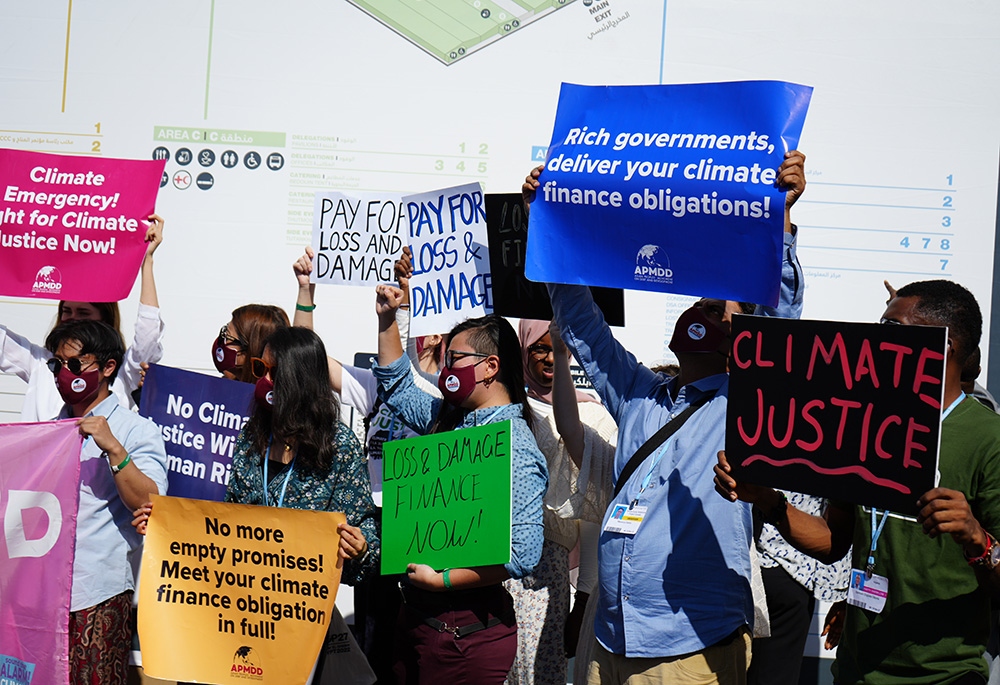
Climate activists, including religious leaders, demand a Loss and Damage fund to compensate developing countries for the impacts of climate change at the 2022 COP27 climate change conference in Sharm El-Sheikh, Egypt. (Doreen Ajiambo)
"While it is clear that the fund still needs operationalizing to receive funds accordingly, this is only perceivable as a delay tactic, particularly by the historical emitters not to take responsibility," opined David Munene, programs manager of the Catholic Youth Network for Environmental Sustainability in Africa, or CYNESA. "This, I say, because we have seen countries with somewhat humane climate sensitivity and acknowledgment of their share of contributions to climate-induced loss and damage emissions take action."
Munene, who is attending the convening, warned that choosing the World Bank as the interim host of the funds was risky as those funds will not reach those affected by climate change and may lack transparency and accountability.
"The loss and damage fund should be channeled directly to the countries hit by climate loss and damage without in-between donor controls," he urged, cautioning against delay in releasing the funds to help vulnerable communities. "The demands of all vulnerable communities are legitimate, godly, and as urgent as yesterday."
Meanwhile, Mirhichan and other victims hope and pray that those details around the funds will be immediately solved and adopted at COP28.
"We have nothing because we have lost everything," he said. "We want to recover from the effects of climate change but have no money. We appeal for that fund or humanitarian agencies to help us with relief food and restock our livestock."

